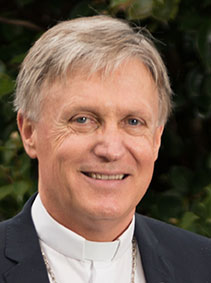 Dear fellow members of the LCA,
Dear fellow members of the LCA,
Soon our church will gather in a General Convention of Synod. No matter who you are or where you worship, the decisions made at the convention will affect you. They’ll affect all of us—and our children and our grandchildren. Even if you won’t be attending as a delegate or visitor, you have been asked to pray for the delegates, for the convention and for the church herself.
The question of Women and the Call to the Office of the Public Ministry will not be the only issue on the agenda, but it promises to be the most controversial one.
It might not be the single most important issue in the kingdom of God, but right now it offers us a practical opportunity to get to the heart of some stuff that really matters: how we hear God speaking in the Bible, who we are as Lutheran Christians and what we hold most dear. If you wonder why we are still having this conversation, it’s because, after many years of study of Scripture and the Lutheran Confessions, and two Synod votes, the question has not been satisfactorily resolved. Nearly 50 years after the union that brought the LCA together, God continues to test our faithfulness. Are we ready to listen?
As the convention gathers in worship, hears God’s promises and celebrates the gospel, God is preparing our church for the even bigger questions to come. The world is rapidly changing. Current global events threaten to make the pace of change increase even more. Now is the time to learn once more what it is to entrust our future to God, believe in his gospel, use his good gifts wisely and well, and follow the guidance of the Spirit who motivates us.
Understandably, there are those who feel anxious about what General Synod will decide. Others just want to move on. To face the future together, we need to confess our fears, identify our hopes and accept the challenges that we are called to face. If we can handle this difficult discussion with integrity, honesty and peaceful hearts, submitting to the inspired word of God as the ‘only true source, norm and rule, and standard of all teaching and practice in the Christian Church’, we will learn some important things that will help us with the issues that lie ahead of us. With God’s help we will continue to proclaim the gospel to a world so much in need of it.
Yes, there is a risk to the church. After Convention, feelings could run high. Some people are saying that whichever way Synod votes on the ordination question, some people—or even entire congregations or groups within congregations—will leave on the grounds of conscience. However, as we work through this issue, shouldn’t we be confident of God’s blessing as we allow the love of Christ to guide our actions?
If you are anxious about all this, please don’t rush into anything that is aimed to harm others or their reputations. Let’s stay away from deeds that we might regret or that might bring the gospel of Christ into disrepute. Division is a sadness that brings no joy or satisfaction. Every other possibility must be explored first, and we must give time for that.
In these weeks leading up to Convention, I encourage you to prayerfully reflect on Paul’s encouragement to the Ephesians (4:2,3): ‘Be completely humble and gentle; be patient, bearing with one another in love. Make every effort to keep the unity of the Spirit through the bond of peace.’
Therefore, before we do anything after this convention, as a whole church we will need to stop, reflect and breathe deeply. If we have prayed and been receptive to the Holy Spirit in the lead-up to Synod’s meeting, then we will surely continue that practice once it is over. If there is no change in our teaching, there will still be substantial pastoral and theological work to be done. If there is change, it will not happen immediately. The preparatory work will take time.
The August 2015 issue of The Lutheran (p22,23) contains a delightful story about Pastor Bill Stolz, about to turn 100, and his wife Melva. Bill says, ‘Whatever happens, I pray that we will not split if the vote is to ordain women. It would weaken our church, not strengthen it, if people leave. I don’t agree with [the ordination of women] but I wouldn’t leave the church over it.’ As someone who, for 26 years of his ministry knew the division of Lutherans in Australia, he goes on, ‘It was a very unfortunate thing when our church was divided. Many of us fought so hard, for decades, for union. We might have our differences, but that shouldn’t break our communion.’
Bill’s positive spirit is a witness to all of us as we face this challenge before us. We are to treasure, and not easily discard, the fruits of the labour of the generations through whom God blessed us with the united church we have today. Through the same Spirit who led and informed those who have gone before us, we can approach this Convention of Synod confident in God’s grace and firmly trusting that the church is his handiwork and his alone.
August 2015
